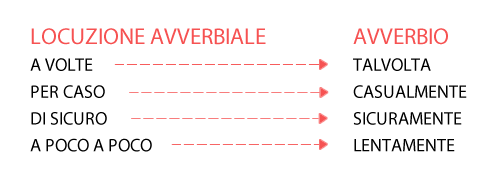Cosa vuol dire
The MODE ADVERB is an invariable part of the sentence and is used to say HOW an action happens. For example, you can say: 'vado DI FRETTA'. Very often adverbs are made up of more than one word, and so are 'locutions'.
ADVERBS OF MANNER (as well as other adverbs) are sometimes formed with more than one word. Just now I said 'Sometimes', which is precisely an adverb of time. So adverbs can also be formed with prepositions, nouns and adjectives combined with each other, and in this case they are called AVVERBIAL LOCUTIONS. Here is a diagram that clarifies the concept:

This dictionary includes the 2000 words of the LESSICO FONDAMENTALE of the Italian language. You can search by word, or by category
|
|
|
|
|
|
|
|
When you are in your AREA RISERVATA, you will be able to download exercises similar to the one below
Trial exercise